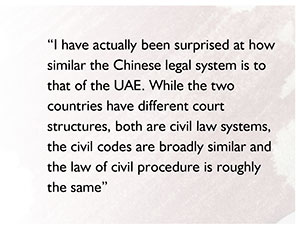Having worked in New Zealand, the UAE and now China, Clyde & Co Partner Richard Bell compares the three, reflects on his years in private practice and tells us why life in-house has never really tempted him.
ASIAN-MENA COUNSEL: Before moving to Clyde & Co’s Shanghai office, you were working for them in the UAE. What have you noticed in terms of cultural and legal differences and what would you suggest to someone making a similar switch?
Richard Bell: In terms of cultural differences, the first thing I noticed is that the ratio of expats to locals is very much lower in Shanghai than in the UAE. In the UAE, expats make up 85 percent of the population and English is widely spoken. There is a significant expat community in Shanghai too, but as a proportion of the population of the city, the numbers are relatively tiny. While Shanghai is regarded as an international city, it is still very much a Chinese city. While some business people speak English, the majority do not. That can make Shanghai a challenging place to live, but it is also what gives the city its undeniable charm and character.
In terms of legal differences, I have actually been surprised at how similar the Chinese legal system is to that of the UAE. While the two countries have different court structures, both are civil law systems, the civil codes are broadly similar and the law of civil procedure is roughly the same.
AMC: What skills are required in the two jurisdictions named above and how easy was it to adjust to their legal systems coming from New Zealand?
RB: It was a fairly steep learning curve when I moved from New Zealand to the UAE, but less so when I moved from the UAE to China.
New Zealand has a common law legal system which is very similar to that of the UK. Moving from that environment to the UAE, which has a civil law legal system was a big change. In the UAE, the law is not overly complicated in that all the laws are contained in a handful of codes. However, the codes are quite broad and often vaguely worded, so it is often difficult to give a definitive view on a particular legal issue. Also, how the law is actually applied by the courts and government authorities can be often be very difficult to predict. In those circumstances, your commercial skills come into play much more than you legal skills. Given the similarities between the legal systems of the UAE and China, it was easier to adjust to China. The skills I acquired in the UAE have turned out to be very useful here.
 AMC: What sets Clyde & Co apart from other international firms in China? RB: In 2013 we established a joint law venture (JLV) with a Chongqing law firm Westlink Partnership. The JLV, which is licensed by the Ministry of Justice and Chongqing Bureau of Justice, operates as the “Clyde & Co Westlink JLV” and offers local law capabilities and rights of audience before the Chinese courts.As well as giving us a presence in South Western China, which is becoming an increasingly important commercial hub, the JLV means that we can offer our clients local law advice with all the advantages of an international firm. Clyde & Co has traditionally been known as an insurance firm, but we are also very strong in the projects & construction, energy, transport and trade & commodities sectors. We pride ourselves on having local law capabilities in the markets in which our clients operate and the JLV gives us that capability in China. AMC: Has the focus and kind of work taken on in China shifted in recent years? What kind of projects do you anticipate over the coming five to 10 years? Going forward, we fully intend to expand the practice to provide a truly full service offering for both our international and domestic clients. AMC: Considering China’s economic slowdown, do you expect more outbound deals going forward? If so, will any particular jurisdictions be invested in more than others? AMC: Will this lead to more integration between Clyde & Co’s offices in China and the firm’s other international offices? AMC: Has the government’s role and prominence in the Chinese economy evolved recently? Do you expect to see this evolution continue? |
 AMC: You’ve spent your entire career working in law firms. Have you ever been tempted to move to an in-house role? What are some of the differences you’ve observed between working in-house and in private practice? RB: Don’t put that idea in my head! I would say that every lawyer in private practice looks over the fence at some point in their career to see whether the grass is greener in-house, but in all honesty, I have never really been tempted. Clyde & Co is a great firm and a wonderful place to work. Bright people, quality clients, interesting work, lots of international travel. It would be pretty hard to give that up. If Conde Nast Traveller Magazine offered me a dual role as in-house counsel and global brand ambassador I might be tempted (if the salary was right), but until that happens I am very happy to stay where I am.–––––––––– E: richard.bell@clydeco.com W: www.clydeco.com |



















